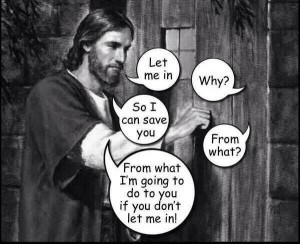Stephen D. Morrison's Blog, page 21
March 15, 2014
Good News! You’re a Bad Person Doomed to Hell!
 This title is obviously meant to be ironic, but it also highlights something that’s been on my mind lately.
This title is obviously meant to be ironic, but it also highlights something that’s been on my mind lately.
I read a great quote from C. Baxter Kruger the other day. He said, “We make a mistake when we start the Gospel with, ‘we are sinners separated from God,’ instead of starting with Jesus–Who is the Father coming after us to embrace us.”
When we preach the Gospel in Christianity, why do we feel the need to start so terribly? Why can’t we just start with grace? (Actually, why can’t the whole presentation just be grace, period?)
I guess I understand why we often preach the Gospel the way we do. I used to for several years! I used to believe I couldn’t preach the Gospel of grace properly until I had first preached the law of sin and death! (Those were my fire and brimstone days!)
But I’ve come to realize that people don’t need to hear what’s wrong with them. They also don’t need to hear about a (mythical) god who is angry at them! 1 The world needs to hear about God’s grace, love, and acceptance!
I don’t think our message should be “this is what’s wrong with you, and this is how you can get better.” I think our message should be “this is how much value God see’s in you, and this is how great His love is for you.”
Conditional Grace
I don’t think we preach an unconditional Gospel. I think, especially in the west, we preach a conditional Gospel. In doing so, I believe we make salvation something we can earn, not something we are freely given through grace.
It’s common to hear the Gospel like this: “God is a (legally) holy God who hates sin. You are sinner, separated from Him, and under His wrath. BUT! Jesus stepped in and took that wrath for you. Now, if you repent, believe, and confess your sins you can be saved from hell.”

We say God has done all this great stuff for you, but it doesn’t work until you do something. Yes, we give lip service to grace, but we act like salvation is kind of up to you! If you don’t do the right things, you go to hell! (Right? Isn’t that a fair assessment?)
But the Gospel is the astounding message of what God had already done for the human race in Jesus Christ! It is the good news of God’s unconditional acceptance, love, and grace for all mankind!
The Gospel is an unconditional message! Add a single condition to the Gospel and you are no longer preaching the Gospel!
The Gospel is not “God accepts you if…” The Gospel is “God accepts you, period!”
My Proposal
So here’s my proposal. Let’s stop preaching “You are bad, and God is far from you, here are all the steps you can take to get right with God.”
Instead, try this out for a change:
“God loves you! He is for you! Jesus has reconciled you back to His Father! He is no longer holding your sins against you! You are forgiven! Therefore, repent (change your mind) and believe the Gospel! See the love of God, and be astonished at what He has done for you! You are His child and He loves you. He wants you to know that love!”
That, my friends, is good news!
What do you think? Leave me a comment!
Like this article? Help me expand my reach by sharing:
Notes:
God has NEVER been angry at ANYBODY! For my thoughts on this, see this article. ↩March 12, 2014
“Jesus Was Forsaken by God” – Disgrace to Grace #3
 Disgrace To Grace is a series of articles written to debunk doctrines that I believe have hijacked the Good News of God’s outrageous grace. Here’s #3, enjoy!
Disgrace To Grace is a series of articles written to debunk doctrines that I believe have hijacked the Good News of God’s outrageous grace. Here’s #3, enjoy!
“My God, my God, why have you forsaken me?”
Last week we talked about Penal Substitutionary Atonement (PSA), and several of the reasons why I disagree with it. Today I want to debunk another aspect of what PSA teaches.
Growing up I often heard Matthew 27:46 1 quoted in presenting the Gospel. The preacher would say something along these lines:
“God is to holy to look at sin. When Jesus died on the cross, the Father turned His back on Him. He abandoned Jesus, and forsake Him to die…”
But did the Father really forsake His Son on the cross?
Absolutely not!
Let me tell you some good news: Jesus, His Father, and the Holy Spirit remained inseparable on the cross. Jesus was not abandoned by His Father!
But how can I come to such a conclusion? Doesn’t Matthew 27:46 clearly say the opposite?
Here’s the deal. This is exactly why holding the bible in its proper context is extremely important. Yes, this verse does say this, but it should not be taken at face value apart from the right context.
Without the right context for this verse you could easily (but wrongly) assume that Matthew 27:46 are Jesus’ words. They are not!
Jesus is quoting David from the Psalms.
Psalms 22 to be specific. Psalm 22 is a prophetic Psalm foretelling the death of Jesus. 2 Psalms 22 starts with “My God, my God why have you forsaken me?”
Essentially Jesus here is quoting the first line of a famous song that every good Jew would have known by heart. Jesus wasn’t making a statement about how His Father left Him. Jesus is declaring the He is the Messiah.
And this is ultimately how I know that the Father did not forsake Jesus on the cross: Psalms 22 clearly says so!
Check out verse 24: “For he has not despised or scorned the suffering of the afflicted one; he has not hidden his face from him but has listened to his cry for help.”
Jesus was not forsaken by God! The perfect union of Father, Son, and Spirit remained unbroken!
God did not forsake His Son on the cross. As Paul writes, “God was in Christ reconciling the world to Himself.” 3
Where was God on the cross? He was in Christ. He did not forsake His Son, nor did He abandon Him! He was right there with Him! The cross was the seamless act of an undivided Trinity.
“My God, my God, why have you forsaken me?” is not a prayer of Jesus. Every single prayer of Jesus starts with “Abba! Father!” The Trinity remains undivided!
What do you think? Leave me a comment below!
Like this article? Help me expand my reach by sharing:
Notes:
“My God, my God, why have you forsaken me?” ↩I encourage you to read all of Psalms 22 in order to fully grasp onto what Jesus really meant to say. Specifically check out the later verses, including verse 27 (a favorite verse of mine). ↩ 2 Corinthians 5:19 ↩March 9, 2014
RoboCop, Superman, and the Incarnation: What We Get Wrong.
 “The stark actuality of Christ’s humanity, His flesh and blood and bone, guarantees us that we have God among us. If that humanity were in any sense unreal, God would be unreal for us in Him. The full measure of Christ’s humanity is the full measure of God’s reality for us, God’s actuality to us, in fact the measure of God’s love for us.” 1
“The stark actuality of Christ’s humanity, His flesh and blood and bone, guarantees us that we have God among us. If that humanity were in any sense unreal, God would be unreal for us in Him. The full measure of Christ’s humanity is the full measure of God’s reality for us, God’s actuality to us, in fact the measure of God’s love for us.” 1
What is the Incarnation?
Incarnation is the theological term for the coming of Jesus Christ into our world. God becomes a man, and takes on human flesh.
Jesus came to the earth to fulfill the eternal dream of God: that we may be adopted as His sons and daughters. 2
Understanding the incarnation is essential, therefore, to grasping the whole scope of the Gospel.
Here is how I would define the incarnation. The incarnation essentially means that God has reached us. He has met us in our fallen, alienated state, and He has reconciled us back to Himself. He has come, God of God, and man of man in order that He might establish a new covenant between God and the human race.
We hid in the garden, but the eternal dream of the Trinity has never changed. Jesus came to find us: to lay hold of the human race, and to bring the human race back to God.
The wonderful truth of the incarnation is this: that God has reached us.
RoboJesus; SuperGodMan
Sadly, we misunderstand the incarnation. The western church has lost its grip on this fundamental truth of the Gospel.
Instead of God reaching us in Christ, we’ve created a vision of the incarnation in which Jesus comes as a sort of “Super-God” to show off. He does miracles, raises from the dead, and lives a perfect life. We look at these facts and in trying to grasp them we undermine the reality of Jesus’ humanity.
Jesus didn’t come to show off His divinity. Jesus came to lay hold of the human race, and reconcile us back to God. 3
In other words, we thought He came as Superman when in reality He came as Clark Kent!
RoboCop, and Superman are both movies used as analogies for Christ’s coming and living on this earth. 4 Both movies ultimately fail in understanding the true heart of the incarnation. In both scenarios the hero, a type of Christ, comes with superhuman abilities. He is different than us, and in every way better than us.
 Both movies undermine the beauty of the incarnation. Jesus does not come and live within our existence as an “other” or as some kind of super-powered human. Jesus comes and lives within our human existence as one of us. Jesus lived within our limitations as a human.
Both movies undermine the beauty of the incarnation. Jesus does not come and live within our existence as an “other” or as some kind of super-powered human. Jesus comes and lives within our human existence as one of us. Jesus lived within our limitations as a human.
Listen to how Robert Capon puts it: “Indeed, the Superman analogy is a perfect illustration of what Jesus is not. He is not from another planet but from this one. He does not have, in His human nature, powers beyond those of mortal men; instead, He is just as mortal as we are. .. Above all, He is born among us as Clark Kent; He lives among us as Clark Kent; He dies as Clark Kent; and He comes forth from the tomb as Clark Kent – not as some alien hotshot in blue tights who, at the crucial moment, junks His Clark Kentness in favor of a snappier, nonhuman style of being.” 5
Jesus did not come to us as Superman, He came to us as Clark Kent. He came and lived within our humanity in order that God might reach us within the depths of our fallenness.
The Unassumed is the Unredeemed
One of the early church Fathers, St. Gregory of Nazianzen, said it like this: “The unassumed, is the unredeemed.” 6
Jesus must reach us in order to fully redeem us. He must reach us from within our brokenness and alienation from God.
God came in Christ to undo the work of Adam as both Son of Adam and Son of God.
In other words Jesus, as both God and man, lays hold of the human race in order to reconcile all humanity back to God. He reached us in the pit of our despair and uncertainty, in order that He might include us into the very life of the Trinity.
Jesus is the God-man: the true God of God, and man of man. He is fully God and fully man, He fully embraces both sides of the eternal covenant.
 Here’s the point: If Jesus didn’t come and embrace the very depths of our humanity, then Jesus failed to reach us. If Jesus failed to reach us, He failed to save us.
Here’s the point: If Jesus didn’t come and embrace the very depths of our humanity, then Jesus failed to reach us. If Jesus failed to reach us, He failed to save us.
The incarnation means God has reached us.
God Understands!
Jesus lived within our existence. He has felt what we feel, and has faced the pains we have faced. Jesus felt rejection, He felt fear, He lived within our Adamic existence and He experienced humanity to the fullest degree.
Which means something truly wonderful: God understands you!
He has been where you have been. He has felt the pains you have felt. God understands you, He has reached you, and He knows what it’s like to be in your shoes.
Jesus did not come as superman nor is He some sort of RoboCop. Jesus came as a real flesh and bone human being. He lived within our humanity, and from within that humanity He reconciled us back to God.
Jesus has reached us!
Notes:
T.F. Torrance, Incarnation: The Person and Life of Christ - Page 185 ↩See Romans 8:29, and Ephesians 1:5 ↩2 Corinthians 5:19 ↩The original RoboCop was an analogy for Christ, and Superman has often been used to describe the incarnation. The most recent Superman movie even paid a pastor to write sermons based on the movie. ↩Robert Farrar Capon, Parables of Kingdom, Grace, and Judgement ↩Letter to Cledonius ↩March 5, 2014
“Jesus Saves! …From God?” – Disgrace To Grace #2
Disgrace To Grace is a series of articles written to debunk doctrines that I believe have hijacked the Good News of God’s outrageous grace. Here’s #2, enjoy!
 Saved.. From God?
Saved.. From God?I want to talk about Penal Substitutionary Atonement today (PSA for short). Chances are you’ve probably never heard that term, but I’m sure you’ve been influenced by it.
PSA sounds like this: “God is a judge, and you are on trial. You’re guilty. You’ve sinned; God sentences you to death. He’s about to slam down the hammer, sending you off to eternal punishment, when suddenly Jesus steps in and offers his life in your place. He suffers the wrath of the judge, and you are forgiven your debt.”
PSA is Penal (to punish) Substitution (in our place) Atonement (to bring about redemption). It is a theory 1 of atonement, held popularly in Christianity, that claims Jesus died in order to appease the wrath of God.
Now, I have several issues with this theory of atonement. I don’t plan to address every issue I see here, but I hope to show you, at the very least, a few of the fundamental flaws in this theory.
I do plan on writing much more about this (both articles and eventually books), so this is definitely not the full scope of what I wish to say. But this will serve as a good introduction to why I have called Penal Substitutionary Atonement a “Disgrace to Grace.”
Problems With PSA
Undermining the Trinity:
This view of atonement, I believe, undermines the Trinity. PSA is a theory that is fundamentally anti-Trinitarian.
The Trinity should be central to our way of thinking about God. At no other place is this more vital then the cross, because the cross is essential to the Gospel story.
Within this model you get a very dualistic vision of the Trinity. On one side there is a holy judge demanding punishment, while on the other side there is a loving Jesus appeasing him.
Essentially, PSA teaches that one Member of the Trinity comes to save you from another Member of the Trinity.
This is not only an inconceivable flaw in logic, but a slap in the face to the early church who fought hard in defending the doctrine of the Trinity.
You can’t separate the inseparable Trinity!
PSA goes against Jesus’ union with His Father: “I and my Father are One.” 2 This union between Father, Son, and Spirit must remain central. The will of God is undivided. PSA splits the Trinity, making the will, and action of Jesus separate from that of His Father’s. Which I believe, is catastrophic.
The Dark Side of Jesus:
Did the fall of Adam change us, or did it change God?
 Obviously, the Garden changed us, not God. So who then did the cross seek to fix? Did the cross fix us, or did it fix God?
Obviously, the Garden changed us, not God. So who then did the cross seek to fix? Did the cross fix us, or did it fix God?
If PSA is correct, then the cross dealt with God, not us.
PSA flips the Gospel on its head. If Jesus died in order to meet a legal requirement within the heart of God, instead of fixing us, and our sin, the cross becomes about fixing God. 3
In other words, according to PSA, Jesus died in order to deal with the “dark side of God.” Jesus may be loving towards sinners, but His Father is furious and filled with wrath. When Jesus died, He died to appease the wrath of God. (To deal with His “dark side.”)
No wonder so many Christians love Jesus, but fear His Father! We’ve been taught that God has a dark side. Heck, even Martin Luther admitted that, while he loved Jesus, he wasn’t sure about His Father.
Again, Jesus said, “I and my Father are One.” There is no dark side of God for the cross to appease. Jesus came because of His great love for us, not because of His great wrath!
History, and The Church Fathers:
Additionally, this theory of atonement is actually relatively new. Not a single church father held to this belief. 4 It was first attributed to a man named Anselm in the 1100s. A whole century after the life of Christ!
 Early church father Athanasius, for example, seemed to have held primarily to the Christus Victor view. 5 Historically, PSA was only taken seriously after the 12th century. Which is not to say that new theories are automatically wrong, and old theories right. Rather, it is to say that there’s something wrong with a theory of atonement that is disconnected from the early church. (Those who witnessed first hand the life of Jesus.)
Early church father Athanasius, for example, seemed to have held primarily to the Christus Victor view. 5 Historically, PSA was only taken seriously after the 12th century. Which is not to say that new theories are automatically wrong, and old theories right. Rather, it is to say that there’s something wrong with a theory of atonement that is disconnected from the early church. (Those who witnessed first hand the life of Jesus.)
It’s not just the early church who reject this theory either. Do you like C.S. Lewis? He didn’t align with PSA. 6
Conclusions
Jesus did not come and die in order to appease the wrath of God. He didn’t come to save you from His angry Father.
Remember? Wasn’t it “For God so loved the world that He gave His Son..” not, “For God so hated the world..”?
The Cross is a revelation of love, not wrath!
Jesus did not come to save you from the Father. He came to save you from sin, and undo the fall of Adam.
The Cross was the act of the whole Trinity: Father, Son, and Spirit. “For God was in Christ, reconciling the world to Himself..” 7
Now I know this may be a big stretch for some of you, and I understand that, it was for me too. But there are just too many errors in this theory of atonement, and it’s gone unchallenged for long enough. 8
Over the next few weeks I plan on coming back to this topic. Until then, please feel free to leave me any question you may have about this, as well as any objections.
Like this article? Help me expand my reach by sharing:
Notes:
While many assert that this is not a theory, but rather a undeniable fact, there is not enough scripture written to adequately support this view. Many of the brightest minds in Theology consider this to be only a theory. Many hold that while it may be possibly what happened, there’s no certain way of knowing. Therefore, I insist that this is theory, not fact. ↩ John 10:30 ↩For more on this argument, check out Dr. C. Baxter Kruger’s book God is For Us. ↩Some of Augustine’s writing seem to use similar language as PSA does, which has lead some to conclude that he is the origin for this theory of atonement. However, Anselm was the first to say that Jesus saved us from God. Augustine, and many church fathers, did say that we were saved from the guilt, and penalty of death. The distinction is that one believed to be sent from God through wrath, and another as the natural consequence of sin. ↩In the next post, I will present some more of the alternate views of atonement for you. Specifically within Christus Victor, Athanasius, and other contemporary theories. So if you don’t know what that is, no worries, next week I’ll give you an overview. ↩For a great video by Greg Boyd, explaining C.S. Lewis’ take on atonement (a more Christus Victor view as well) click here. ↩2 Corinthians 5:19 ↩I plan to write more next week on the scriptural refutes against PSA. (Not all of my arguments are just philosophical.) ↩February 26, 2014
“Sin Separates You From God” – Disgrace to Grace #1
I’m excited to announce a new series: Disgrace to Grace. Disgrace to Grace is about debunking several disgraceful ideas that spit in the face of the Gospel. I hope to boast in the outrage of Grace, and set you free from bad beliefs. Here’s #1. Enjoy!
Disgrace to Grace #1- Sin Separates You From God
 First of all, separation from God is an impossibility. Seeing that it is actually Christ who sustains you, and upholds your very existence (See Col. 1:17 and Heb. 1:3) any sort of separation from Christ would mean complete annihilation.
First of all, separation from God is an impossibility. Seeing that it is actually Christ who sustains you, and upholds your very existence (See Col. 1:17 and Heb. 1:3) any sort of separation from Christ would mean complete annihilation.
If Christ left you, you, as you know you, would cease to exist.
Additionally, if sin truly separates us from God, you are going to have to theologically do away with the omnipresence of God (which is a fancy way of saying “God is everywhere”). If sin separates us from God then our sin is more powerful than His omnipresence. In other words, if our sin separates us from God, then our sin changes the unchanging God.
I’ve heard this idea a lot growing up in church. Whenever I would sin, I felt like I had to re-earn my way back into relationship with God. I believe this Disgrace to Grace is detrimental to our relationship with God. It can’t go on any longer!
Where did this horrible idea come from? This Disgrace to Grace comes from two scriptures: Isaiah 59:2 and Habakkuk 1:13.
In Isaiah 59:2 we read “..your iniquities have made a separation between you and your God..” (NASB)
Doesn’t this clearly say sin separates us? Not necessarily. Think about it like this: Separation from God is an illusion that infiltrated our mindset after the fall. The illusion of separation was a by-product of the fall. It is the Adamic mind that believes this illusion, but it has always been just that, an illusion. There is no separation.
Paul says this very thing in Colossians 1:21: “Once you were alienated from God and were enemies in your minds because of your evil behavior.” (Emphasis mine) Our alienation from God was always an illusion, not a reality.
Remember, it was Adam and Eve who hid from God after their sin, not the other way around.
Onto the next verse then..
Habakkuk 1:13 is where we get the whole “God can’t look a sin” idea. But I challenge you to read this verse in its proper context.
This verse is in the middle of a dialogue between Habakkuk and God. He is essentially saying this: ”God you are so holy and pure. You can’t look at sin. So why are you? Why do you let sin run rampant in the world?”
Habakkuk is not saying that God actually can’t look at sin. He is talking to God, and implying the exact opposite: that God does look at sin.
The Truth
Sin cannot separate you from God! You have been eternally joined to the inescapable presence of God. He is in you, and you are in Him. You have been joined in union with Christ. You can’t go anywhere or do anything to change that fact!
This Disgrace to Grace is often taught to invoke a fear of sin, and in doing so, sin is often given more precedence than God. We think sin is bigger than grace!
But if the Gospel tells us anything, it’s that sin can’t hold a candle to grace. The grace of Jesus Christ is far greater, and far stronger than even the worst of sins.
Stop fearing sin! Absolutely nothing can separate you from God!
“..Though sin is shown to be wide and deep, thank God His grace is wider and deeper still!”
(Romans 5:20 J.B. Phillips)
What do you think about this weeks Disgrace to Grace? Share your thoughts below!
Like this article? Help me expand my reach by sharing:
February 23, 2014
Should Christians Drink Alcohol?
 Alcohol gets misunderstood in Christianity a lot. Here are four misconceptions cleared up. My goal is that this post will set you free from the bondage of religion and give you permission to enjoy life to the fullest!
Alcohol gets misunderstood in Christianity a lot. Here are four misconceptions cleared up. My goal is that this post will set you free from the bondage of religion and give you permission to enjoy life to the fullest!
Alcohol misconception #1: “God is disappointed with you if you drink alcohol.”
Do you think God was disappointed with Jesus when He drank alcohol? Or what about that time when He turned water into wine? No! Of Course He wasn’t!
God is not disappointed with you either if you drink alcohol. (Actually, He’s NEVER disappointed in you!)
So why do we think this way? Alcohol has negative connotations, I understand that. There’s no ignoring the cultural abuse of it as a substance. However, scripturally there is nothing wrong with alcohol. While some try to make a case for why alcohol is a sin, nothing could be further from the truth. Alcohol is actually given as a gift from God for our enjoyment!
In a song of praise for all the wonderful things God has made, the Psalmist writes: “..wine to gladden the heart of man..” (Psalms 104:15) Here the bible actually praises God for wine as a gift to mankind!
The problem is that many Christians and non-Christians alike feel guilty for drinking alcohol. They think that God is somehow angry at them because they drink alcohol. But let me tell you plainly, alcohol is actually a gift from God!
Check out this awesome quote from Benjamin Franklin: “Wine is constant proof that God loves us and loves to see us happy.”
Alcohol misconception #2: “Biblical references to wine are really just references to unfermented grape juice.”
 The Hebrew word used in the Old Testament for wine is yayin. Yayin is used 130 times in the Old Testament. In using the bible to define the bible, let’s look at a passage that uses this word and see if it make sense to either be fermented or unfermented grape juice.
The Hebrew word used in the Old Testament for wine is yayin. Yayin is used 130 times in the Old Testament. In using the bible to define the bible, let’s look at a passage that uses this word and see if it make sense to either be fermented or unfermented grape juice.
In Genesis 9:21 we read that Noah drank too much wine, and accordingly he became drunk. The word for wine in this verse is yayin. If wine here is not alcoholic, but rather unfermented grape juice as some would have you believe, then how could Noah get drunk on it?
Obviously, if Noah got drunk on yayin then the wine the bible refers to is not grape juice, it’s wine. Pure, alcoholic wine!
Some have tried to say that the biblical version of wine was a non-alcoholic grape juice. But if this is the case, then the story of Noah is an impossible story. Grape juice doesn’t intoxicate. Therefore, wine in the bible must have been an intoxicating substance.
Not only is it biblically inaccurate to say this, but scientifically as well. Science backs up the idea that wine in the bible was most likely alcoholic wine. Science has understood for centuries the process of fermentation. Fermentation is a process that happens naturally, and in order to stop it we must intervene with certain chemical processes. This is why in 1869 Mr. Welch (of Welch’s Grape Juice) invented a way to keep grapes from fermenting.
Which means, when Jesus made wine He made real wine, not grape juice. It also means that He drank that wine! How many Christians would readily admit that our God is the kind of guy who enjoys a nice glass of vino every now and then? Maybe God is in a good mood after all!
Alcohol misconception #3: “Alcohol takes away from your spirituality.”
 Here’s the deal. If alcohol takes away from your spirituality then Jesus wasn’t very spiritual (because He drank alcohol and so did His disciples). And if Jesus fails to be “spiritual” enough (whatever that even means!) then He is ultimately inadequate as a savior.
Here’s the deal. If alcohol takes away from your spirituality then Jesus wasn’t very spiritual (because He drank alcohol and so did His disciples). And if Jesus fails to be “spiritual” enough (whatever that even means!) then He is ultimately inadequate as a savior.
It’s a plain old Gnostic idea (Gnosticism is a heresy in the early church that taught that earthly things are evil and heavenly things are perfect) to say that alcohol takes away from your spirituality. This way of thinking dangerously takes up that early heresy and presents it again in the name of “wisdom”.
Don’t give in when someone says things like “it’s not wise to drink alcohol, it could mess up your spiritual life.” They are preaching a Gnosticism! This sort of teaching was refuted heavily in the early church, especially in the writings of Paul.
Take for example Colossians 2:20-22:
If with Christ you died to the elemental spirits of the world, why, as if you were still alive in the world, do you submit to regulations— “Do not handle, Do not taste, Do not touch” (referring to things that all perish as they are used)—according to human precepts and teachings? These have indeed an appearance of wisdom in promoting self-made religion and asceticism and severity to the body, but they are of no value in stopping the indulgence of the flesh. (ESV)
Paul here is combating this very idea. Gnosticism came into the early church and sought to destroy its very life blood by infusing it with self-made religion. Those who say that drinking alcohol steals away from your spiritual life are nothing short of gnostics hiding their ideas behind “wisdom.”
Remember, Paul said “All things are permissible, but not all things are helpful..” (1 Corinthians 10:23) Don’t let anyone add rules where God has none.
Alcohol misconception #4: “Drinking alcohol will ruin your witness./Avoid the appearance of evil.”
 1 Thessalonians 5:22 says “Abstain from all appearance of evil.”
1 Thessalonians 5:22 says “Abstain from all appearance of evil.”
This translation comes from the King James Version. If you know much about translations you will know that the KJV is probably one of the least accurate translations. It is filled with errors, and mistranslations.
Sadly, from this one verse many have come to the conclusion that we as Christians are supposed to avoid all appearances of evil. Which has lead to a separatist mentality.
But check out this verse from the highly reliable New American Standard Version: ”Abstain from every form of evil.” (Emphasis mine)
The word here in the KJV that is translated “appearance” is more properly rendered as “form”. As you can see, this verse is not saying that we should try to avoid looking evil. This is saying that we should avoid all evil!
That’s a huge difference! The KJV makes it sound like Christians have to clean up their lives and pretend to be perfect little peaches. But that’s not at all what is implied here! We aren’t supposed to “avoid the appearance of evil” we’re supposed to “avoid evil.”
This has lead many to think that drinking alcohol somehow ruins your witness, but if this were the case Jesus must have had a terrible witness!
Jesus was not at all afraid of appearing evil. In fact, He was often accused of being a sinner because of the company He kept! (See Matthew 11:19)
Many Christians live in bondage because they believe it’s their job to “look perfect” and “avoid the appearance of evil.” But let me tell you the good news! Don’t worry for a second about what other people think! Stop trying to make yourself look perfect in other peoples eyes. Stop trying to avoid the appearance of evil! You don’t have to! Just be you, and let the rest of the world deal with it!
If anything, NOT drinking alcohol will ruin your witness. Jesus is the best example of this. He came eating and drinking with sinners. He was totally okay with getting His hands dirty with the down and outs of life. He wasn’t afraid to spend time with sinners. We shouldn’t be either!
Going to your local pub and making friends with whoever you find there is a more Christ-like thing to do then going to church!
Don’t limit your witness by NOT drinking. Don’t outcast your friends with how “holier than thou” you are. Just be yourself, and have a good drink! Enjoy life and be Jesus to everyone you meet!
Conclusions
 If you want to drink alcohol, don’t let religion stop you. But also don’t lose your self-control. (See Galatians 5:22-23) I know some people have personal convictions about this, and I respect that. You should totally listen to your convictions.
If you want to drink alcohol, don’t let religion stop you. But also don’t lose your self-control. (See Galatians 5:22-23) I know some people have personal convictions about this, and I respect that. You should totally listen to your convictions.
Just don’t make rules where God hasn’t! Just because you have a conviction for something doesn’t mean that you should require everyone else to follow that.
The bottom line is this, as Robert Capon once said, “Religion begins after relationship has broken down.”
It’s relationship with God, not with His rules that Christianity is all about. We are not the “rule keepers of God” we are the “ones He loves.” Remember relationship, and religion will lose any hold it every tried to have on you.
You are free, and in your freedom you are allowed to enjoy your life! God actually wants you to enjoy this life He’s given you. So get out there, enjoy life, love God, and preach the good news to everyone you meet!
Seize life! Eat bread with gusto,
Drink wine with a robust heart.
Oh yes—God takes pleasure in your pleasure!
Dress festively every morning.
Don’t skimp on colors and scarves.
Relish life with the spouse you love
Each and every day of your precarious life. (Ecclesiastes 9:7-8 MSG)
What do you think? Do you drink alcohol? Share you thoughts with me below!
Like this article? Help me expand my reach by sharing:
February 19, 2014
Is Grace Permission to Sin?
 Let’s say, for example, that your town has the best firemen in the country. Your towns firefighters have never missed a single fire. Which means no burned down houses, and no injured people. In a word, your firefighters are flawless. They know how to fight fires.
Let’s say, for example, that your town has the best firemen in the country. Your towns firefighters have never missed a single fire. Which means no burned down houses, and no injured people. In a word, your firefighters are flawless. They know how to fight fires.
They are so good at their job that they spend about half of their time going throughout the town in order to raise awareness about dangerous elements that may lead to fires. They teach school children fire safety, they instruct entrepreneurs on to how to keep their businesses safe, and they even go into homes and inspect them for any fire hazards.
Now let’s say theoretically that your town has this great burger joint called “Bob’s Burgers and Fries.” They don’t always keep to the standard for fire safety, but they do make good food. They have this nasty habit of leaving out cooking oil in their small kitchen.
Whenever the fire fighters make their weekly rounds, they pay special attention to Bob’s Burgers and Fries. They tell them week in and week out that they need to clean up their kitchen or else they could be in serious trouble.
Now Bob, the owner, means well. He is always very apologetic, but the problem is he’s a scatterbrain. He couldn’t remember a thing to save his life. The moment the fire fighters walk out his door he is off doing something else, completely forgetting to take care of the fire hazards.
So one day when the inevitable happened, no one was really that surprised. The firemen received a call about a kitchen fire over at Bob’s Burgers and Fries. So they rush over right away.
Now imagine with me what the firehouse may do when they arrive at the burger joint. What’s their first action? Do you imagine them scolding Bob about his lack of safety? Do you see them writing Bob up for his safety violation?
Of course not! They wouldn’t do paperwork at a time like that. They would get busy putting out that fire!
In any way could you possibly conclude that the excellence of the fire fighters is permission to be sloppy with fire safety? Absolutely not!
“Hyper-Grace”
 So let me ask you. Do you think that preaching grace unreservedly and boasting in the free-for-nothing forgiveness of God is in some way giving permission to sin?
So let me ask you. Do you think that preaching grace unreservedly and boasting in the free-for-nothing forgiveness of God is in some way giving permission to sin?
As Paul writes in Romans 6:2, “God forbid!” Or even better yet, as The Cotton Patch Translation puts it, “hell no!”
“Hyper-grace” is no more permission to sin than “good fire fighting” is permission to set your house on fire!
The problem is that Christianity has played the “behavior modification” game for so long it’s forgotten the “Gospel of grace” game! Which consequently is the only game we were ever given to play.
So when someone gets a hold of the wonderful message of grace, and when they announce that message to the world, it can be often misunderstood. The church has preached hyper-morality for so long that when hyper-grace is preached it appears to be permission to sin.
But listen. We are not called to be the worlds morality police. We are called to preach the Gospel of grace, period!
One of the criticisms to an emphasis on grace is that it makes light of sin and therefore gives people permission to sin.
But that’s total rubbish! Grace is not permission to sin anymore than a firefighter is permission to set a fire! Preaching grace without conditions is not permission to sin, it’s freedom from sin! (It’s also the Gospel!)
Grace is the wonderful message of a God who has reconciled the world to Himself, and has stopped counting our sins against us! That is in no way permission to sin. That is in every way freedom from the horrible bondage of sin! Hooray!
So what do you think about “hyper-grace?” I want to hear your thoughts below!
Like this article? Help me expand my reach by sharing:
February 15, 2014
Oh The Wonder of Salvation! (A Poem)
I have been swept up into unparalleled beauty and wonder.
Astonishment, delight, and ecstasy- such is the language of the Gospel.
In Him, I am found.
In Him, I am whole.
In Him, I am accepted.
In Him, I am free, forgiven, loved, and intoxicated with life.
The world as we know it is bursting with Divine life.
The Trinity finds it’s expression in life- our life.
We are one with Christ. Beautifully, fully, and inexpressibly united to all that He is.
Hid in Him. United to Him. Sharing in His life.
What a glorious reality!
What drunken stupor such realities implore? What compares to this?
The very Trinity has made me Their home! The very Being of God- the fullness of deity- is my happy inheritance.
Oh the joy!
Oh the bliss!
Oh the wonder of salvation!
We are home. We are free.
No condemnation! No fear! No shame!
Life! Abundant life!
Glory, glory, glory! Hallelujah!
He has done it. We are reconciled. God is pleased. We are loved. Life is ours, and we are One!
The Great Dance has overcome us. We are included in the hilarity, beyond all liking and happening.
It is finished!
It is finished!
It is finished!
Like this post? Help me expand my reach by sharing:
February 12, 2014
Did Adolf Hitler Go To Hell?
 Adolf Hitler: perhaps the most evil human being to walk this earth in the last century. Certainly, if anyone “deserves” hell it would be him.
Adolf Hitler: perhaps the most evil human being to walk this earth in the last century. Certainly, if anyone “deserves” hell it would be him.
So what do you think? Is Adolf Hitler in hell right now?
If you would have asked me this a few years ago I would have quickly said yes. “Of course he is.”
But who am I to answer so certainly the eternal fate of another person?
How big is your grace?
Would you be surprised to arrive at the pearly gates and find Hitler there?
I would definitely be shocked.
But honestly, I would also praise God for it.
“You let him in?! What a truly wonderful God you are!”
You see, as much as I find it morally suitable to send Hitler to hell, I also can’t escape how amazing grace is. Grace is the astonishing news that no matter what you do, you are still accepted, you are still loved, and you are still forgiven in Christ!
Grace boasts in the cross alone. Jesus paid a high price for the forgiveness of sins. That’s not to be made light of! He died, and in His death He announces unconditional grace for all!
If our definition of grace has any limitations, it is not grace. Grace is either free, and unconditional or it is not grace at all.
Any form of grace that excludes the possibility that anyone can find themselves freely accepted and forgiven, even Hitler, is not grace at all. That’s conditional acceptance. That’s law. That’s not grace!
If your understanding of grace is not big enough to reach even the most evil person in the world, then your grace is not big enough. If grace isn’t for sinners, then who is it for?
If grace isn’t big enough to get Hitler home to the heavenly country- no if, and’s, or but’s about it- then grace is not enough, period.
Grace is either unconditional, or it’s a scam.
Could Hitler be in heaven? Maybe. Maybe, not. It’s not really for me to know. That’s ultimately God’s business.
But the truth remains: absolutely nothing disqualifies you from grace!
So what do you think? Is there an edge to grace? Is there a condition to grace? Leave me a comment below!
Like this article? Help me expand my reach by sharing:
February 10, 2014
Sorry, but Jesus Wasn’t a White Guy.
 “The scholarly consensus is actually that Jesus was, like most first-century Jews, probably a dark-skinned man.” (Source)
“The scholarly consensus is actually that Jesus was, like most first-century Jews, probably a dark-skinned man.” (Source)
Sorry Charlie, but Jesus wasn’t a white guy from Utah. He wasn’t an American individualist. He came from the middle eastern country of Israel, as a Jew. He most likely had brown skin, spoke Aramaic , and if you saw Him in the airport, you might take a second look.
Aramaic is a semitic language of Arabic, which means the two languages sound alike. Most Americans would feel slightly anxious if they heard it spoken on an airplane. (Which is not to say there’s anything wrong with Arabic, but that the American perspective of the language has been skewed due to 9/11.)
But does it really matter what color Jesus’ skin was? Not really. It’s irrelevant to be honest.
But it does matter when we westernize Jesus and create Him in our cultural image. When we divorce the person of Jesus from the historical backdrop of ancient Israel, we run the risk of misunderstanding the gospel entirely. Ancient Israel, the Jewish people, and the eastern culture that Jesus comes to is the only context in which we can properly understand the gospel.
As T.F. Torrance writes, “To detach Jesus from Israel or the Incarnation from its deep roots in the covenant partnership of God with Israel would be a fatal mistake.” (The Mediation of Christ, page 23.)
A Gentile Jesus
 My fear, and Torrance’s fear, is that we have “gentilized” Jesus, and thus removed Him from the backdrop of Israel’s history with God. The proper context for who Jesus is, is the history of Israel, and the cultural mindset of the people. We can’t separate Jesus from the history and culture of Israel, because Israel is the context in which God’s self-revelation is actualized in the life of Jesus.
My fear, and Torrance’s fear, is that we have “gentilized” Jesus, and thus removed Him from the backdrop of Israel’s history with God. The proper context for who Jesus is, is the history of Israel, and the cultural mindset of the people. We can’t separate Jesus from the history and culture of Israel, because Israel is the context in which God’s self-revelation is actualized in the life of Jesus.
Think about it like this. When God decided to come to the earth, and when He decided to revel Himself to humanity as a whole, He didn’t come as a Greek, or a Roman, or as an American. He trusted the self-revelation of His nature in Jesus only to the Jewish people. He actualized His revelation within their mindset, and their culture.
For whatever reason, God chose that Israel would be the backdrop for His self-revelation in Jesus. Israel is the canvas for the gospel. Therefore, to divorce the person of Jesus Christ, and His work on the cross from the backdrop of Israel is to ultimately misunderstand both.
I believe Christianity has been hijacked by Western ways of thinking, and Western perceptions of God. We have interpreted the nature of God on our terms instead of on His. His terms are the culture, and context of Israel, not any other culture or nation.
West vs. East
 Israel is an eastern nation, and Jesus was an eastern thinker. Therefore, Christianity, fundamentally, is an eastern belief. It’s not that there is anything wrong with western culture, but there is something wrong with understanding Jesus through Western ways of thinking instead of Eastern ways of thinking.
Israel is an eastern nation, and Jesus was an eastern thinker. Therefore, Christianity, fundamentally, is an eastern belief. It’s not that there is anything wrong with western culture, but there is something wrong with understanding Jesus through Western ways of thinking instead of Eastern ways of thinking.
There is much that can be said about the differences in western and eastern culture and mindsets. However, here are three areas where I feel we often misunderstand God and the Gospel because of our western lens:
Western mindset: Focused on the individual, on intellect, and on legal structures.
Eastern mindset: Focused on the community, on mystery, and on priestly structures. (Especially in Jewish culture)
These cultural focus differences have, I believe, caused us to misinterpret the gospel.
Due to the influence of western thought, which is rooted in both Roman, and Greek cultures, our theology has been developed by these cultural distinctions. I believe that we have taken Christianity and made it far too individualistic, intellectualistic, and legalized.
Because this is such a massive topic, hardly one that I can fully express in a 1,500 word post, I will focus in on these three areas and on how I feel they have influenced our understanding of the Gospel.
Penal Substitution
One of the most striking effects that our western thinking has had on Christianity is the legalization of the Gospel. Due to Roman ideas of law and order, we have made the Gospel a message of judicial satisfaction instead of properly understanding the Gospel as a priestly and mediatory announcement.
Jesus did not come to fulfill some abstract legal requirement from God. He did not come to die in our place, standing before a justice-driven judge hell bent on punishing us. God the Father is not a blood thirsty deity that needed appeasing.
The Gospel is not a court case, it is a love affair!
 We have misunderstood the Apostle Paul, and we have turned the Gospel into a court case where God settles His legal issues with humanity. This idea is often referred to as Penal Substitutionary Atonement. Which is simply a theory of atonement that says Father God has wrath that must be satisfied, and therefore Jesus stands in and takes that wrath for us. Jesus get’s punished (Penal) in our place (Substitution) in order to satisfy a legal requirement of God.
We have misunderstood the Apostle Paul, and we have turned the Gospel into a court case where God settles His legal issues with humanity. This idea is often referred to as Penal Substitutionary Atonement. Which is simply a theory of atonement that says Father God has wrath that must be satisfied, and therefore Jesus stands in and takes that wrath for us. Jesus get’s punished (Penal) in our place (Substitution) in order to satisfy a legal requirement of God.
But this is a disastrous error. The cross doesn’t condition God into being gracious towards us. That flips the whole gospel on it’s head! Making the cross change God, instead of changing us. If the Gospel is about satisfying God, then the reason for Jesus’ death was to fix God, not to fix us.
But the Gospel is not the news of how Jesus has fixed God. The Gospel is the announcement of how He has fixed us, and freed us from the slavery of sin! The cross changed us, not God. Jesus didn’t die in order to twist God’s arm, and make Him forgive you.
The cross is about love, not law!
We have failed to see that Jesus was acting not as a legal replacement for humanity, but rather as a priestly and mediatory substitute for humanity! The former is rooted in western law and order, while the later is rooted in the Jewish temple. Jesus came as the high priest, and the mediator between God and man. He did not come to fulfill some legal duty before an angry judge. He came to perform a priestly and mediatory work!
Penal Substitutionary Atonement is a western idea that has hijacked the Gospel. It is rooted in Roman ideas of law and order, instead of the Jewish concept of priest and mediator.
Mystery and Community
Additionally, another way in which the gospel has been hijacked by western thought is through the over-intellectualization of it’s mystery. Simply put, we haves sought to removed all traces of mystery, and unknowing from the Gospel. Due to the western focus on intellectual understanding, any gospel idea that is mystical or supernatural is often intellectualized out of mystery.
For example. The Gospel announces the absolutely beautiful reality and mystery of our union with Christ. Paul calls it “the mystery of the ages” which is “Christ in you.” (Colossians 1:25-27)
 Our mystical union with Christ is one of my favorite gospel realities. The utter nearness of God, and oneness of our spirit with His, is what makes the Gospel good news! However, this reality is far to often underemphasized in western Christianity because it intellectually makes little sense. But this reality remains mysterious and supernatural. It can not be solely intellectually understood. Mystery belongs in the Gospel, and our western intellect should be held back from trying to remove it.
Our mystical union with Christ is one of my favorite gospel realities. The utter nearness of God, and oneness of our spirit with His, is what makes the Gospel good news! However, this reality is far to often underemphasized in western Christianity because it intellectually makes little sense. But this reality remains mysterious and supernatural. It can not be solely intellectually understood. Mystery belongs in the Gospel, and our western intellect should be held back from trying to remove it.
The final distinction that remains between western and eastern understandings of the Gospel, is that of community vs individual. In eastern societies, the community, the “we”, is greater than the individual “I.” We have taken our western lone-ranger ideas, and plastered them onto the Gospel. Making the emphasis on our individual decision, or our individual relationships with God. However, the Gospel is a corporate message. It is universal in it’s scope, effecting the whole world. Jesus died for the whole world, not just the individual.
Karl Barth once said that Theology is best worked out within community. We need one another’s perception and ways of thinking to understand God and life. My relationship with God is very personal, but it should also be corporate. We are all on a journey together, and I am on a journey personally. Both ideas are important to remember.
Perception
We need to see that the Gospel is not an eastern message, and God is not an American God. Our lens of perception should change from the American ways of thinking into the Jewish ways of thinking. Jesus came to the Jewish people. The Gospel is rooted in Jewish culture. Our perception needs to change to understand it, and Him, correctly.
 Jewish was a Jew, but does this mean that God is Jewish? No. Instead of defining God by our terms, we should see that God is expressing Himself through our terms. When Jesus came as a Jew, it wasn’t because God is a Jewish person. Rather, God chose Israel and entrusted it with His self-revelation. Jewish culture is the language God has chosen to express Himself in.
Jewish was a Jew, but does this mean that God is Jewish? No. Instead of defining God by our terms, we should see that God is expressing Himself through our terms. When Jesus came as a Jew, it wasn’t because God is a Jewish person. Rather, God chose Israel and entrusted it with His self-revelation. Jewish culture is the language God has chosen to express Himself in.
This is why we need to learn how to speak the language that God is speaking. We need to see that Jesus came within the context, the language so the speak, of the Jewish people. Instead of westernizing Jesus, we should learn how to understand Jesus on His terms by understanding the culture He came to.
Jesus was not a white guy. His culture, and His ways of thinking are foreign to us. In order to understand Him properly we must see Him through a Jewish mindset, not a western one.
Like this article? Help me expand my reach by sharing it:



